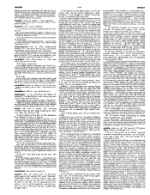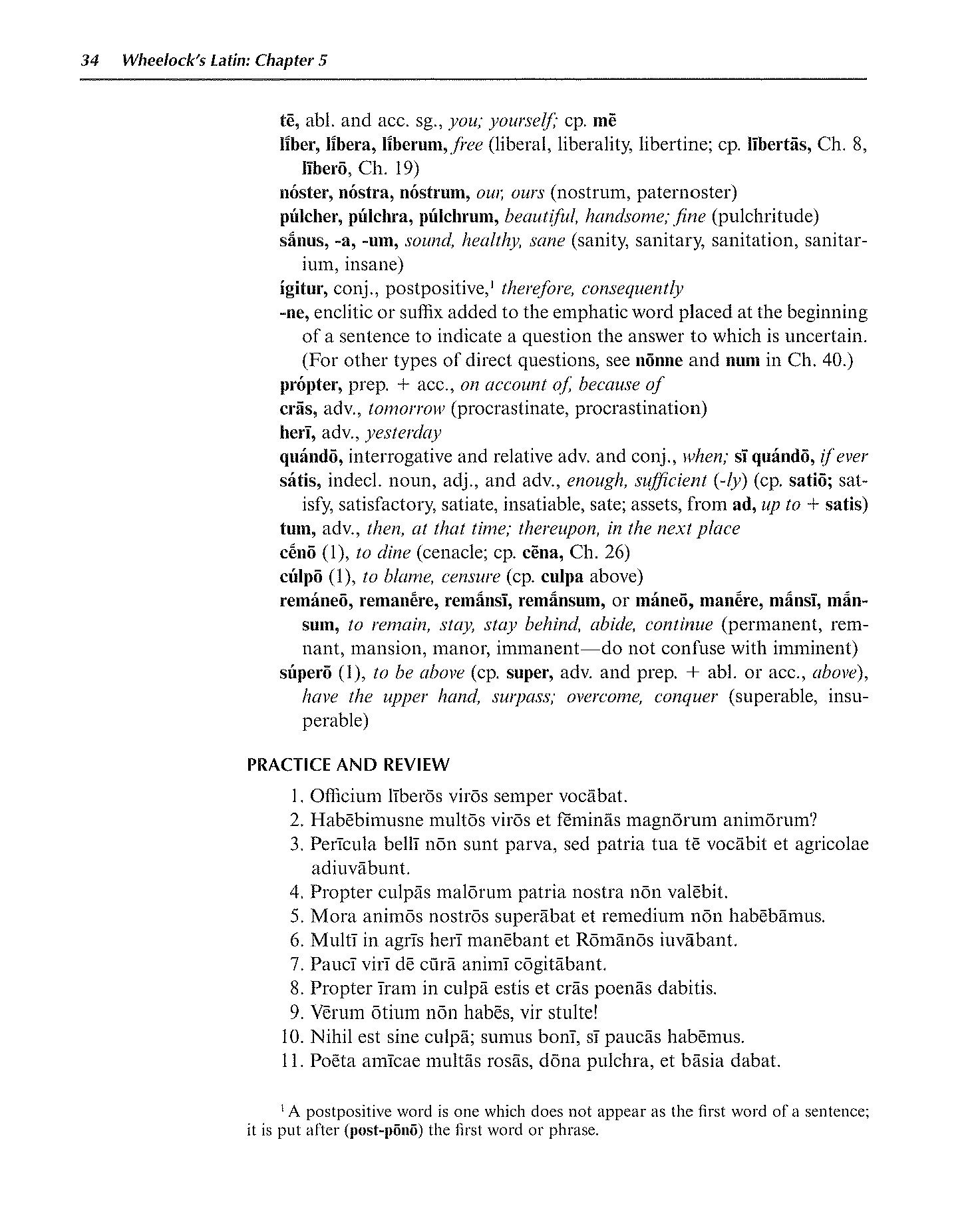
page_listing.tpl
page_subListingDetails.tpl
sub_listingDetails_style1.tpl
sub_listingDetails.title.tpl
manēre to stay
manēre is a Latin Verb that primarily means to stay.
Definitions for manēre
Wheelock's Latin
Verb
- 1
to remain, stay, stay behind, abide, continue
English derivatives:
Permanent remnant mansion manor immanent-do not confuse with imminent
Oxford Latin Dictionary
Verb
- 1
To remain in the same place, not to go away, stop. (b) (in places implying a spec. activity). (c) (of things) to remain unmoved, be left; to remain still, stay fast.
- 2
To lodge, stay. (b) (of things) to be located.
- 3
To stay one's hand. have patience, wait. (b) (w. acc.) to wait for a (person to arrive, be ready, etc., or an occurence).
- 4
(of events, fates, etc.) To be in store for, await.
- 5
To continue to be, remain (in a specified state or condition). (b) (w. pred. adj. or pple.).
Sentences with manēre
Latin to English
Putō eōs malōs quī in urbe maneant īnfīrmōs futūrōs esse sine duce.Compare I think those evil men who remain in the city will be weak without their leader.
Rōmae manēbat.Compare He was remaining in Rome.
Tu hic maneo: ego induco eques.Compare Do you remain here: I will lead on the cavalry.
Aruns morior, nec diu maneo superstes filius pater.Compare Aruns dies, nor does the father long remain to survive the son.
Conjugation table for manēre
Cactus2000
| ACTIVE | |
| Indicative present | Indicative imperfect |
| maneō manēs manet manēmus manētis manent | manēbam manēbās manēbat manēbāmus manēbātis manēbant |
| Indicative perfect | Indicative pluperfect |
| mānsī mānsistī mānsit mānsimus mānsistis mānsērunt / mānsēre | mānseram mānserās mānserat mānserāmus mānserātis mānserant |
| Indicative future | Indicative future perfect |
| manēbō manēbis manēbit manēbimus manēbitis manēbunt | mānserō mānseris mānserit mānserimus mānseritis mānserint |
| Subjunctive present | Subjunctive imperfect |
| maneam maneās maneat maneāmus maneātis maneant | manērem manērēs manēret manērēmus manērētis manērent |
| Subjunctive perfect | Subjunctive pluperfect |
| mānserim mānseris mānserit mānserimus mānseritis mānserint | mānsissem mānsissēs mānsisset mānsissēmus mānsissētis mānsissent |
Infinitive present manēre Infinitive perfect mānsisse Infinitive future mānsūrum esse | Imperative present manē manēte Imperative future manētō manētō manētōte manentō |
| Indicative present | Indicative imperfect |
| - - manētur - - - | - - manēbātur - - - |
| Indicative perfect | Indicative pluperfect |
| - - mānsus est - - - | - - mānsus erat - - - |
| Indicative future | Indicative future perfect |
| - - manēbitur - - - | - - mānsus erit - - - |
| Subjunctive present | Subjunctive imperfect |
| - - maneātur - - - | - - manērētur - - - |
| Subjunctive perfect | Subjunctive pluperfect |
| - - mānsus sit - - - | - - mānsus esset - - - |
Infinitive present manērī Infinitive perfect mānsum esse Infinitive future mānsum īrī | Imperative present - - Imperative future - manētō - - |
| PARTICIPLE | ||
| Participle present active | ||
| Nom. | manēns | manentēs |
| Gen. | manentis | manentium |
| Dat. | manentī | manentibus |
| Acc. | manentem | manentēs |
| Abl. | manente | manentibus |
| Participle future active | ||
| Nom. | mānsūrus | mānsūrī |
| Gen. | mānsūrī | mānsūrōrum |
| Dat. | mānsūrō | mānsūrīs |
| Acc. | mānsūrum | mānsūrōs |
| Abl. | mānsūrō | mānsūrīs |
| Participle perfect passive | ||
| Nom. | mānsus | mānsī |
| Gen. | mānsī | mānsōrum |
| Dat. | mānsō | mānsīs |
| Acc. | mānsum | mānsōs |
| Abl. | mānsō | mānsīs |
| Gerundive | ||
| Nom. | manendus | manendī |
| Gen. | manendī | manendōrum |
| Dat. | manendō | manendīs |
| Acc. | manendum | manendōs |
| Abl. | manendō | manendīs |
| Gerund | Supine | |
| Nom. | manēre | mānsum |
| Gen. | manendī | mānsū |
| Dat. | manendō | |
| Acc. | manendum | |
| Abl. | manendō | |
Data sources
Notes
- Definitions
- Frederick M. Wheelock, Wheelock's Latin, 6th ed., rev. Richard A. LaFleur (New York, NY: HarperCollins Publishers, 2005): 34.
- P. G. W. Glare, Oxford Latin Dictionary, Vols. 1-8 (Oxford: Clarendon Press, 1982): 1072.
- Word frequencies
- Christopher Francese, "Latin Core Vocabulary," Dickinson College Commentaries, last modified 2014, http://dcc.dickinson.edu.
- Paul B. Diederich, The Frequency of Latin Words and Their Endings, PhD diss., (Columbia University, 1939).
Bibliography
Allen, Joseph H. Allen and Greenough's New Latin Grammar for Schools and Colleges: Founded on Comparative Grammar. Edited by James B. Greenough, George L. Kittredge, Albert A. Howard, and Benjamin L. D'Ooge. Boston, MA: Ginn & Company, 1903.
Crystal, David. A Dictionary of Linguistics and Phonetics. 6th ed. Oxford, UK: Blackwell Publishing, 2008.
Delatte, Louis, Suzanne Govaerts, Joseph Denooz, and Etienne Evrard. Dictionnaire fréquentiel et index inverse de la langue latine [Frequency Dictionary and Inverse Index of the Latin Language]. Liège, Belgium: Laboratoire d'analyse statistique des langues anciennes de l'Université de Liège (L.A.S.L.A.), 1981.
Diederich, Paul B. The Frequency of Latin Words and Their Endings. PhD diss., Columbia University, 1939.
Francese, Christopher. "Latin Core Vocabulary." Dickinson College Commentaries. Last modified 2014. http://dcc.dickinson.edu/latin-vocabulary-list.
Gildersleeve, Basil L., and Gonzales Lodge. Gildersleeve's Latin Grammar: Third Edition, Revised, and Enlarged. 3rd ed. London, England: Macmillan and Co., 1903.
Glare, Peter G.W. Oxford Latin Dictionary. Vols. 1-8. Oxford, England: Clarendon Press, 1982.
Krüger, Bernd. "Latin Conjugation Tables." Cactus2000. Accessed May 5, 2023. https://latin.cactus2000.de/index.en.php.
Pierson, Nick. "Sound of Text." Accessed October 26, 2019. https://soundoftext.com.
Wheelock, Frederick M. Wheelock's Latin. 6th ed. Revised by Richard A. LaFleur. New York, NY: HarperCollins Publishers, 2005.
Wiktionary Contributors. "Victionarium." Wikimedia Foundation, Inc. Updated March 18, 2019. https://la.wiktionary.org/wiki/Victionarium:Pagina_prima.
Citation
Chicago (17th ed.)
Allo Contributors. "maneō, manēre, mānsī, mānsum (v.) - Latin Word Definition." Allo Latin Dictionary. Last modified . Accessed February 19, 2026. http://ancientlanguages.org/latin/dictionary/maneo-manere-mansi-mansum.
Entry created on . Last updated on .







